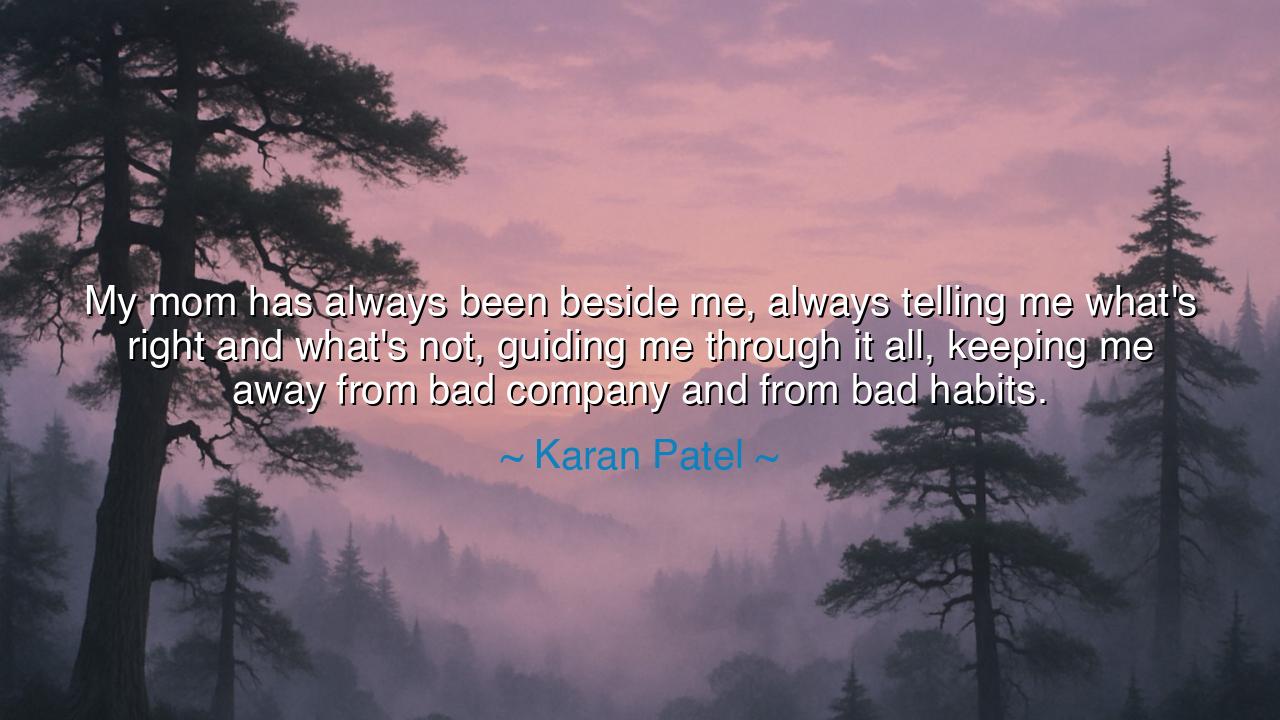
My mom has always been beside me, always telling me what's right
My mom has always been beside me, always telling me what's right and what's not, guiding me through it all, keeping me away from bad company and from bad habits.






The words of Karan Patel — “My mom has always been beside me, always telling me what's right and what's not, guiding me through it all, keeping me away from bad company and from bad habits.” — carry the weight of eternal truth, for they speak of the mother as the guardian of the soul, the first light that protects the child from darkness. In every age and every land, the mother has stood as the unseen warrior — the quiet force who shapes destiny not through conquest or speech, but through presence, through love, and through the patient labor of teaching right from wrong.
To say “she has always been beside me” is to acknowledge the divine constancy of maternal love. The mother is not only the giver of life but the sustainer of it — the moral compass in a world that constantly pulls toward chaos. The ancients saw her as the first teacher, the earliest philosopher, the one who whispers into the child’s heart before the world can shout into their mind. Her lessons are not written in books but etched into conscience. She guards her child not only from danger but from temptation, teaching that true strength lies not in defiance, but in discernment.
When Karan speaks of being guided away from bad company and bad habits, he speaks to an ancient virtue — the discipline of choosing one’s path wisely. The wise have always said that character is not destroyed by storms, but by companionship with the unwise. It is the mother who first teaches the sacred art of judgment: which friends uplift, and which ones drag downward; which pleasures build, and which ones destroy. Her love, though tender, carries the sternness of truth — for to protect a soul, she must sometimes wound pride, and to guide it toward light, she must sometimes stand against its will.
In this, his words echo the story of Saint Augustine, who in his youth strayed into the fires of vanity and desire. Yet his mother, Monica, never ceased to pray, to counsel, and to weep for him. When he fled from virtue, she followed with faith. It was her guidance, her endurance, that finally led him back to God and to greatness. Augustine would later write that his mother’s tears were more powerful than any sermon, and her love more relentless than any storm. Like Karan Patel’s mother, she understood that to shape a son’s destiny is not to control it, but to stand beside it faithfully until it remembers its true direction.
The beauty of Karan’s words lies also in their humility. He does not claim to have found success alone; he knows that his wisdom, restraint, and sense of morality were cultivated by another’s care. In a time when many forget the hands that molded them, his gratitude becomes a sacred act of remembrance. Gratitude, the ancients said, is the mother of all virtues — the recognition that we are not self-made, but carried upon the shoulders of love. To honor one’s mother is not simply to thank her, but to live according to the lessons she planted within.
There is also quiet heroism in the mother’s unseen work. She does not fight with swords or armies, yet she battles daily against the unseen enemies — ignorance, corruption, temptation, despair. Her shield is patience, her weapon is truth. When she tells her child what’s right and what’s not, she is building the walls of inner strength that will one day protect them when she is gone. Every wise adult is the echo of a mother’s voice, every moral act the reflection of her early guidance.
The lesson here is both eternal and urgent: listen to the voices that love you enough to correct you. In youth, discipline may feel like chains, but in maturity, it is revealed as freedom. Avoiding bad company and bad habits is not a denial of life, but a preparation for greatness. Surround yourself with those who make you wiser, and cherish those who care enough to say “no” when the world says “yes.” Such love may seem stern, but it is the hand that keeps your soul from drifting.
So let Karan Patel’s words be a testament to every mother who stands watch over her children’s hearts. The world will tempt, confuse, and corrupt — but her guidance, if remembered, will never fade. To honor her is to live with integrity, to act with wisdom, to choose good over gain. For though her body may one day rest, her counsel lives eternally in the conscience she shaped. That is the immortality of a mother’s love — and the truest inheritance a child can ever receive.






AAdministratorAdministrator
Welcome, honored guests. Please leave a comment, we will respond soon